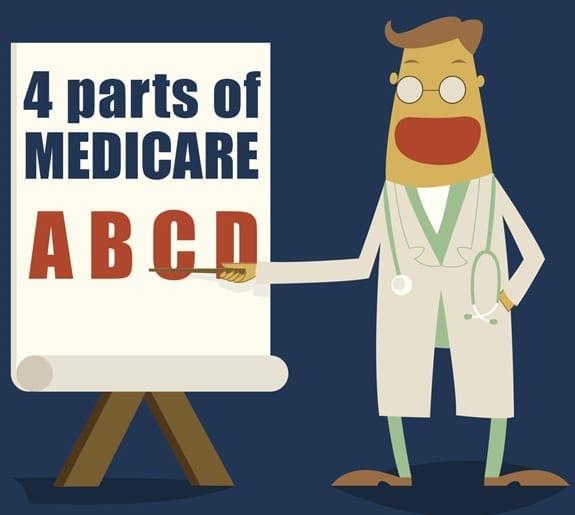So you’re turning 65? Congratulations!
It’s time to start taking advantage of your Medicare benefits. And just how do you do that?
First, here’s a quick overview of what Medicare offers:
Medicare has 4 parts; A, B, C, & D. Part A pays for hospitalization, and most eligible people do not pay premiums for Part A. Part B covers doctor fees, outpatient care, home health care, and preventive screenings for Cancer, Glaucoma, Diabetes, and other diseases. Part B has a monthly premium, which for most beneficiaries is $104.90 this year. Part C is Medicare managed care and Part D is prescription drug coverage. Both of these options are available through private insurance companies.

If you already get benefits from Social Security or the Railroad Retirement Board(RRB), you will automatically be enrolled in Part A and Part B starting the first day of the month you turn 65. You’ll get your red, white, and blue Medicare card in the mail about three months before your 65th birthday. If you don’t want Part B, follow the instructions that come with the card, and send the card back. If you keep the card, you’ll keep Part B and pay your Part B premiums which will be deducted from your Social Security Check each month.
If you are not currently receiving Social Security or RRB benefits (because, for instance, you’re still working), you need to sign up for Part A and/or Part B. It’s easy to do. You can sign up by calling Social Security at 1-800-772-1213 or by calling your local Social Security Office. You can also apply online for Part A (if you don’t have to pay premiums) and Part B at
www.socialsecurity.gov/medicare. The whole process can take less than 15 minutes for most people.
If you’re eligible for Part B when you turn 65, you have a seven-month window that begins three months before the month you turn 65, includes the month you turn 65, and ends three months after the month you turn 65. Sign up early! That way you’ll avoid any delay in getting your benefits. If you sign up during the first three months of your Initial Enrollment Period, in most cases your coverage starts the first day of your birth month. (If your birthday is on the first day of the month, your coverage starts on the first day of the month before.)
If you didn’t enroll in Part A and/or Part B when you were first eligible because you were working and covered under a group health insurance, you have a Special Enrollment Period (SEP). This means you can sign up any time while you or your spouse are working and you have employer or union group coverage. Or you can enroll during the eight-month period that begins after your employment ends or your group health coverage ends, whichever happens first. With part C Medicare Advantage plans you only have the 3 months prior to when your Part B starts. For example, if your Part B Medicare benefit starts on January 1 then you can enroll starting October 1.
Generally, you won’t pay the Late Enrollment Penalty if you sign up during your a Special Enrollment Period.
But here’s an important caveat: If you have COBRA coverage or a retiree health plan, you don’t have coverage based on current employment. You’re not eligible for a Special Enrollment Period when that coverage ends AND you may be subject to the Late Enrollment Penalty.
For more information about enrolling in Medicare, visit
www.medicare.gov or my calling 1-800-MEDICARE (1-800-633-4227).
I am a licensed insurance agent in Maine and I am happy to help explain this process and answer any of your questions. I can also help you review the many supplemental insurance plans available in your area and give you the advice that you should have to choose the right plan for you and your spouse. Call me anytime. My number is 207-370-0143 or send me a message using
my contact page and I will respond by email or call you, which ever you prefer. Good luck and welcome to Medicare!
 If you would like to talk to me, ask a question or schedule a meeting at your home or a nearby meeting place, you can reach me at 207-370-0143 or use my simple form on the CONTACT ME page of this site to send an email message. The best part about working with me is that it will not cost you anything to meet with me to discuss your options or to review the plans that are available. I am paid by the insurance companies in the form of a commission if you enroll in a plan. You will not pay any more than anyone else and you are under no obligation whatsoever to enroll in any plans if you meet with me.
If you would like to talk to me, ask a question or schedule a meeting at your home or a nearby meeting place, you can reach me at 207-370-0143 or use my simple form on the CONTACT ME page of this site to send an email message. The best part about working with me is that it will not cost you anything to meet with me to discuss your options or to review the plans that are available. I am paid by the insurance companies in the form of a commission if you enroll in a plan. You will not pay any more than anyone else and you are under no obligation whatsoever to enroll in any plans if you meet with me. 

 Yes. If you’re not retiring and you are continuing to work then you may want to consider enrolling in Medicare Part A and delaying Part B until you retire and leave your employer sponsored health insurance plan. Even if you’re not receiving Social Security benefits at age 65, you’re still eligible for full Medicare benefits. This includes the Part A (hospitalization), as well as Part B (doctors’ visits and outpatient care) and Part D (prescription drugs); you pay a premium for each. But if you are not collecting social security benefits then it’s up to you to contact Social Security to sign up for Medicare only. You must do this within your “initial enrollment period.” This period starts three months BEFORE the month you turn 65, includes the month you turn 65 and continues three months AFTER that — a seven-month period.
Yes. If you’re not retiring and you are continuing to work then you may want to consider enrolling in Medicare Part A and delaying Part B until you retire and leave your employer sponsored health insurance plan. Even if you’re not receiving Social Security benefits at age 65, you’re still eligible for full Medicare benefits. This includes the Part A (hospitalization), as well as Part B (doctors’ visits and outpatient care) and Part D (prescription drugs); you pay a premium for each. But if you are not collecting social security benefits then it’s up to you to contact Social Security to sign up for Medicare only. You must do this within your “initial enrollment period.” This period starts three months BEFORE the month you turn 65, includes the month you turn 65 and continues three months AFTER that — a seven-month period.






